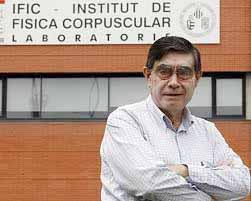
Royal Academy of Sciences (RAC) of Spain has unanimously approved the accession of full university professor of the Universitat de València José Bernabeu. Bernabeu’s research work has been mainly addressed to elementary particle physics, in the field of unified electroweak interactions inside and beyond the Standard Theory.
Royal Academy of Sciences created in 1903, gives awards and honours to those partners that stand out in their professional activity. Awards are given since 1958. The Medal will be given in a public event at the seat of BBVA Foundation of Madrid, at a date still to be determined.
José Bernabeu was born in Mutxamel (Alicante) in 1945, and he graduated in Physics by the Universitat de València in 1967. He received the Special Award and the National Award of Physics, as well as the doctorate in Physics with the Special Award in 1970.
In 1971 starts a postdoctoral stay in the European laboratory of the european organization for nuclear physics (CERN), in Ginebra, where he went through different work placement, adjunct lecturer and researcher, until 1978. In 1976 he achieved the place as adjunct professor at the University of Barcelona, and in 1977 in Valencia. He obtained the chair of Oviedo in 1980, and the one of Valencia in 1981.
Apart from Valencia, he has taught in universities such as Barcelona, Louvain-la-Neuve, Bergen, Lyon, La Plata, Oviedo and Paris-Orsay. He was the Director of theoretical physics department at the Universitat de València from 1982 to 1988, when he was appointed Manager of the National Program for High Energy Physics in the Spanish Plan for Science and Technology, from 1988 to 1992.
He published more than 200 articles in scientific magazines of greatest impact in his activity field. Some of the results discovered quantum effects of non-decoupling associated with spontaneous symmetry breaking responsible for interactions, effects that were then measured and confirmed in LEP experiments of the CERN.
In neutrino physics, he has contributed to model neutrino masses and mixing, and non-conservation of lepton number. Another activity field is the symmetry, as the violation of symmetry matter and antimatter, and symmetry under Temporal Inversion.
He is currently involved in physics of the LHC (Large Hadron Collider) accelerator and its implications in Astroparticle and Cosmology Physics.
He has been president or member of some Spanish and international scientific boards. Among others, there may be mentioned: National Director of the Interuniversity Group for Theoretical Physics (GIFT by its Spanish initials) from 1984 to 1987, Member of the LHC Committee at CERN from 1994 to 1997, academician of the Argentina Academy of Exact, Physical and Natural Sciences since 2000, President of the High Energy Particle Physics Board (HEPP) of the European Physical Society (EPS) from 2003 to 2005, Chairman of the International Advisory Committee for the Canfranc Underground Laboratory (LSC by its Spanish initials) from 2004 to 2007, Member of the Scientific Advisory Committee (SAC) for astroparticle physics in Europe (ASPERA) since 2004.
He received King James I prize for Basic Research in 2008. He is the coordinator of Singular Infrastructure of Medical Physics (IFIMED) in Valencia. In 2011, Royal Academy of Physics (RSEF) gave him its Medal.
Last update: 2 de february de 2015 08:06.
News release


















